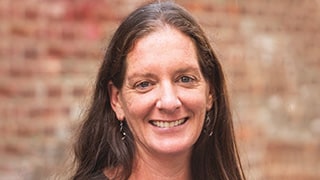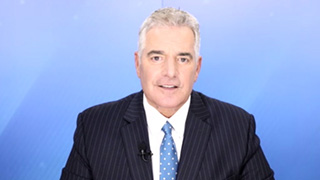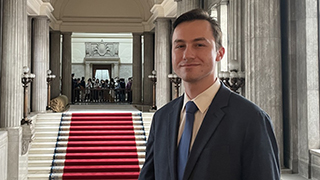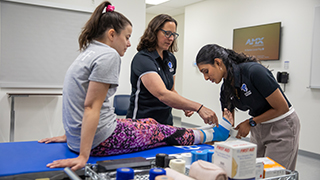Dean Discusses Framework to Teach Emerging Leaders With Emmy Award-Winning Broadcaster
Thursday, August 29, 2024

Mary Kate Naatus, Ph.D.
Mary Kate Naatus, Ph.D., assistant provost and dean of Continuing Education and Professional Studies, explored the importance of lifelong learning, collaboration and leadership with Steve Adubato, author, speaker, and Emmy Award-winning broadcaster of Lessons in Leadership, along with co-host Mary Gamba. The episode can be viewed here.
"As educators, we need to provide opportunities for students to have experiential learning, meaning we provide the basics, we provide frameworks, but at the same time, they need to learn by doing," noted Naatus, who is also an associate professor of marketing, Stillman School of Business.
Naatus discussed the significance of exposing students to situations where they’re uncomfortable, where they need to take a risk, where they have to step out of their comfort zone and develop those leadership skills. "I think in the post-pandemic era with a lot of our students having spent a number of years in a fully virtual environment, it’s even more important that we create those uncomfortable experiential social contexts where they have to navigate in new situations. I think that was always valuable, but I think today it’s absolutely necessary."
Adubato, Gamba and Naatus reflected on how in today’s rapidly changing world with the onslaught of artificial intelligence (AI), it is necessary to teach today’s emerging leaders in significantly different ways than even 10 years ago.
Naatus explained:
The way work is done in the field of business [and across many fields] has changed. So we need to provide opportunities for students who are investing at our universities for four years, for six years, the opportunity to constantly upskill so that their skills remain relevant in the workforce, in the industries, and also in life in general. This way they feel like they have the tool chest and the competencies to be able to achieve their greatest potential no matter what it is that they do. I think every single field or industry that we think of is disrupted not only by AI but also by other rapid technological changes. Seeing the world gaining global competencies, I would include that among that lifelong learning that is so enriching on many levels.

Steve Adubato, Ph.D.
Adubato, a long-time friend of the University, has taught his popular master class on leadership and communication through the Buccino Leadership Institute for many years. He and Gamba discussed with Naatus the unique methods used by the Institute and Seton Hall to teach leadership skills to undergraduates.
Naatus further explained:
The Buccino Leadership Institute attracts the best and brightest undergraduate students from all over the country and even other parts of the world. We put them through a rigorous four-year curriculum that embeds numerous uncomfortable situations, experiential learning opportunities and student-led initiatives into a more robust framework than most of the other leadership programs out there. We do provide a certificate to students upon competition, but it’s not just a certificate program ... It creates relationships. It creates leadership networks far beyond the classroom, beyond the University with our alumni network, with professionals. I really think it is a one-of-a-kind program.
As parents, themselves, Naatus, Adubato and Gamba reflected on the investment that many families make who send their children to college and that institutions must recognize this and incorporate every opportunity to help set up these students for success. They need to be critical thinkers, but they also need to have job-ready skills. Schools need to help create pathways so students will gain experience while still in college.
The three discussed how a focus on internationalization and global collaboration is essential to today’s leaders.
"I have the fortune to oversee the Office of International Programs. We provide study abroad experiences for Seton Hall students at partner universities virtually all around the globe. We have partner schools on several continents, and we’re also part of an international consortium that would allow students to study anywhere that they choose. We have about 250 international students on our main campus and we’re looking to grow that number of international students," shared Naatus.
She noted that being able to collaborate in teams and immerse yourself in the language and culture of others is essential in many industries and fields. "For example, we’re partnering with the College of Arts and Sciences on a Global Friends Language program. So students that are living here from abroad who speak a foreign language are partnered with students at Seton Hall studying that same foreign language so that they have natural practicing opportunities as well as cross-cultural exchange, which is enriching for all parties in the situation."
To learn more about how Seton Hall educates today’s emerging leaders, please visit Steve Adubato’s Lessons in Leadership with Mary Kate Naatus.
Categories: Education






